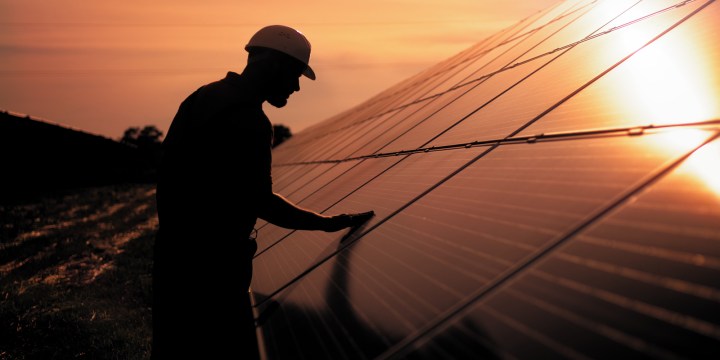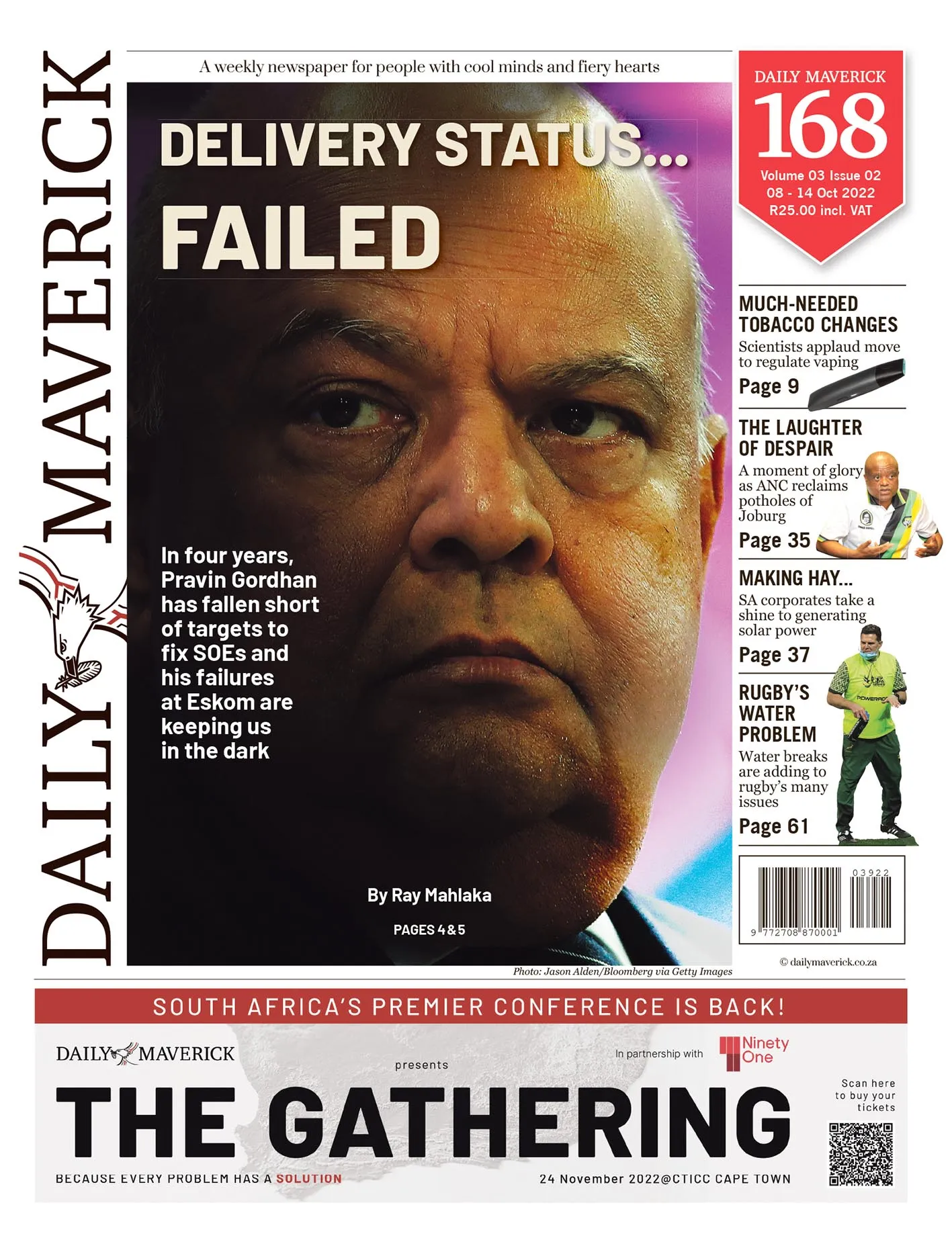THE BIG SWITCH
SA corporates take a shine to solar power to secure electricity supply

As Eskom falters, South Africa’s big companies are doing it for themselves — renewably.
With the electricity supply from Eskom looking increasingly uncertain, more and more companies in South Africa are turning to solar power to ensure they have an uninterrupted supply.
Over the past 12 months, the Shoprite Group has increased its installed capacity of solar photovoltaic (PV) systems by 82% to 26,606 kilowatt-hours (kWh). Its 143,674m2 of solar panels at 62 sites is equivalent to the size of 20 soccer fields — and can generate enough energy to power 3,735 households.
The group is still focused on growing its solar-powered and renewable electricity installations while improving energy efficiency to reduce its environmental footprint and reduce strain on the national grid.
Other initiatives include a drive to reduce electricity consumption by installing LED lights at its sites, saving 399 million kWh so far.
Using renewable energy and embracing energy efficiency are part of Shoprite’s plans to reduce indirect greenhouse gas emissions and mitigate climate change.
In the past financial year, Shoprite has increased its total renewable installations from 32 to 62. These now produce 40,894 megawatt-hours (MWh), which is 11,614MWh more than in November last year.
At the same time, the retailer has increased its fleet of solar-powered trailers by 234 to a total of 1,041. Solar energy powers the trailers’ refrigeration, tail lifts and surveillance systems.
“We are incredibly proud of our increased use of renewable electricity, and we intend to build on this in the coming years to meet our science-based emission reduction targets, including net zero greenhouse gas emissions by 2050,” says Sanjeev Raghubir, Shoprite’s group sustainability manager.
“We’ve saved more than R16-million in electricity costs in the past year through our solar PV systems and these additional savings are passed on to our customers.”
Visit Daily Maverick’s home page for more news, analysis and investigations
Anglo’s big switch
The mining giant Anglo American revealed plans this week to launch Envusa Energy, a jointly owned company with EDF Renewables.
Under the agreement, Envusa Energy will launch more than 600MW of wind and solar projects in South Africa, a major first step towards the development of a system that is expected to generate 3GW to 5GW of renewable energy by 2030. This first phase is expected to be fully funded and ready for construction to begin in 2023.
Envusa Energy is expected to supply Anglo American with a blend of renewable energy generated on Anglo American’s sites and renewable energy transmitted via the national grid.
This energy portfolio approach will aggregate energy from geographically dispersed renewable generating facilities and allocate it to meet the load demand at Anglo American’s operations.
Nolitha Fakude, chair of Anglo American’s management board in South Africa, says the joint venture is a milestone in Anglo American’s global decarbonisation journey and a step forward for South Africa’s clean energy future.
“We are making great strides towards our 2040 target of carbon-neutral operations, while contributing to South Africa’s just energy transition through our responsible approach,” she says.
“We believe that the energy transition presents a fresh opportunity for South Africa and the rest of the region to build a clean and inclusive energy ecosystem that can create significant new economic opportunities. I am very encouraged by our progress.”
Tristan de Drouas, chief executive of EDF Renewables South Africa, says the 600MW first tranche of projects will be added to almost 1GW that EDF Renewables will be building or operating in the country by 2023. These include 420MW of wind projects in Bid Window 5 of the Renewable Energy Independent Power Producer Procurement Programme.
Power purchase agreements were signed with Eskom and the Department of Mineral Resources and Energy last month.
“Together, these projects further EDF Group’s CAP 2030 strategy, which aims to double our net renewable installed energy capacity worldwide (hydropower included) from 28GW in 2015 to 60GW by 2030,” De Drouas said.
The regional renewable energy ecosystem will also serve as a clean energy source for the production of green hydrogen for Anglo American’s nuGen Zero Emission Haulage Solution – a planned fleet of hydrogen-powered ultra-class mine haul trucks. This will significantly reduce on-site diesel emissions and support the development of South Africa’s Hydrogen Valley.
Solar incoming
Though corporates such as Shoprite and Anglo American are seeking to become more self-sufficient in energy, other companies are looking at solar projects as an income source.
The automotive platform Cars.co.za has invested more than R2.5-million in a Sun Exchange solar leasing project that provides off-grid solar power and battery storage to Karoo Fresh, a commercial farm in the Karoo.
The transaction, which buys Cars.co.za more than 16,000 solar cells, means the company can leverage its balance sheet to drive sustainable energy, and also create an alternative income stream over the 20-year lifespan of the solar project.
The 332.1kW solar plus 640kWh storage project is Sun Exchange’s first fully off-grid project. It provides continuous, reliable solar power for Karoo Fresh’s irrigation system, enabling the farm to expand its production of brassica and saffron, while becoming more sustainable and cutting its reliance on costly and polluting diesel.
The project is expected to replace about 90,000 litres of diesel a year, eliminating an estimated 240 tonnes of carbon dioxide emissions, equivalent to about 960,000km driven in an average passenger vehicle.
Sun Exchange is in the planning stages of the next phase of the project, which will eliminate the farm’s reliance on diesel altogether.
Alastair MacMurray, co-founder of Cars.co.za, says the project gave the company the ability to align with a progressive business and achieve major environmental goals for 2022.
“We’re proud to be associated with Sun Exchange and the Karoo Fresh solar project as part of our vision to protect our environment and be a carbon-negative business,” he says.
Abe Cambridge, CEO of Sun Exchange, says the platform enables everyone to gain access to the clean energy economy: “With growing global focus on ESG [environmental, social and governance], this increasingly includes sustainability-minded companies that want opportunities to earn while making a positive impact.” DM168
This story first appeared in our weekly Daily Maverick 168 newspaper, which is available countrywide for R25.



















 Become an Insider
Become an Insider
Interestingly, it is no longer a green decision. The cost of renewables, the cost of storage, the grid’s unreliability and the cost of the grid combine perfectly such that now it is an obvious decision for businesses. It is now cheaper and more reliable to run on model of solar plus storage, relying on diesel if solar runs a bit short and then having grid as a last-resort. That it is green and annoys the fossilheads is merely the cherry on top.